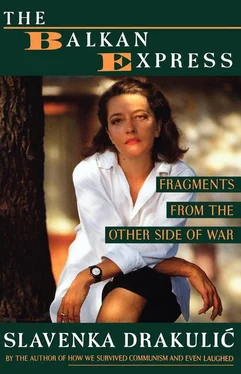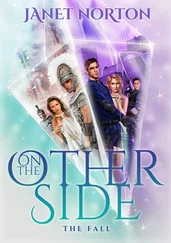‘I am sorry, my system of values is different,’ she wrote at a time when it was already out of the question to write, to say – even to think – such things because any difference, individual, political, artistic or of any other kind had already been suspended.
For me there have always existed, and always will exist, only human beings, individual people, and those human beings (God, how few of them there are) will always be excepted from generalizations off any kind, regardless of events, however catastrophic. I, unfortunately, shall never be able to ‘hate the Serbs’, nor even understand what that really means. I shall always, perhaps until the moment the kind threats on the phone are finally carried out, hold my hand out to an anonymous person on the ‘other side’, a person who is as desperate and lost as I am, who is as sad, bewildered and frightened. There are such people in this city where I write my letter. Nothing can provide an excuse any more, everything that does not directly serve the great objective has been trampled upon and appears despicable, and with it what love, what marriage, what friendship, what theatre performances! I reject, I will not accept such a crippling of myself and my own life. I played those last performances in Belgrade for those anguished people who were not ‘Serbs’ but human beings, human beings like me, human beings who recoil before this horrible Grand Guignol Jarce of bloodshed and murder. It is to those people, both here and there that I am addressing this now. Perhaps someone will hear me.
It must have been night when she sat down to write that letter. She wrote it in one go, she could not sleep. Outside they were washing the street, the slush of water and human voices rose to the window and then fell back without quite reaching her. The heating in her apartment was already turned off. G slept: he threw himself across the bed and fell asleep in his clothes as if dead tired. She could not sleep, could not shake off the feverish anxiety that had been gnawing at her for days. Then she sat at the kitchen table and wrote the letter. She read it. Like a testament, she thought, while the grey fingers of the dawn crept in through the window.
Why must everything be the same, so frighteningly uniform, levelled, standardized? Haven’t we had enough of that? I know this is the time of uniforms and they are all the same, but I am no soldier and cannot be one. I haven’t got it in me to be a soldier. Regardless of whether we are going to live in one, five or fifty states, let us not forget about the people, each of them individuals, no matter on which side of our wall they happen to be. We were born here by accident, we are this or that by accident, so there must be more than that, mustn’t there? I am addressing this letter to emptiness, to darkness.
I carry her letter around with me as my own burden, as an inner picture of the war, as a way of explaining to others what is happening to us and our friendships in the war: how the war devours us from the inside, eating away like acid, how it wrecks our lives, how it spawns evil within us, and how we tear the living flesh of those friends who do not feel the same as we do. It is not enough that death is everywhere around us. In the war death becomes a simple, acceptable fact. But life turns to hell.
I watch her sitting on the edge of the chair, tense as if still expecting nothing but blows. She does not say much, she has said it all in the letter and now she can speak no more. She can only repeat herself. When I mention Zagreb, her cheeks burn red, she appears to be on the verge of tears. She says she does not know what she will do – what can a foreign actress do in someone else’s city? I’d rather wash dishes, she says. Her choice, her life-changing decision is condensed into a single word: rather . For a while we go on sitting in a friend’s apartment in a foreign city and talking about the war. We talk about how the war cannot be escaped by leaving for New York, the war is here, too. The very fact that she has left, that she has changed her life, is also the war. The war has become the pivotal point in our lives and it determines everything else. Besides, an escape also defines you, labels, determines and cripples you. I watch her lovely face aware that this is no longer a face from the movies. But I cannot see the most important things, eyes cannot reach so deep. The loneliness and the desolation of a woman who has lost her profession and her homeland can only be guessed at.
I do not tell her that the Balkan Cinema in Zagreb where she last saw all her friends has changed its name. It is now called the Europa Cinema – the name symbolically conveys the whole meaning of this war.
NEW YORK DECEMBER 1991
Ayoung boy is sitting across from me in a deep red plush armchair and drinking Coke. Although it is only eleven in the morning, on the first floor of the City Cafe in Zagreb a pianist in a black tuxedo is softly playing an evergreen tune. The arched windows look out on the sunlit facades around the square. It is early spring when the air is still cool and moist and there is a smell of snow.The boy gazes through the window for a while, then at the piano player and finally looks straight at me. This is not for me, I don’t belong here, he says. Calmly, as if stating a simple, perfectly obvious fact. For a brief moment I am puzzled. He is wearing Levi’s and a denim jacket, his hair falls over his forehead in spiky strands, he has two silver earrings in his ears – in fact, he looks like any other boy of his age who has nothing else to do but hang out in a cafe in the morning and play football in the afternoon. But it is not his appearance that stands as a barrier between him and the world around him – the soft hum of voices, the laughter of the waitress in the cafe where all the sounds from the outside are muffled – it is something else. Ivan came here from the war, from Vukovar. His father was taken prisoner (at least he hopes so, that would mean he is still alive), his house was burned down and his mother and five younger brothers and sisters are refugees. And I am a journalist puzzled by his calm, almost light voice, his calm hands on the table, his composure and, most of all, his age.
Rather than looking forward to our next meeting, I have been anxious about it. I met him two days ago. When the door of the apartment opened, I found myself in a hallway, face to face with a young boy no taller than me. His lean, narrow face still had no need for shaving. ‘Is your brother at home?’ I asked; I knew that the eldest brother was nineteen. One of the commanders of the Vukovar defence had told me that he and his brother had been among the twenty-six resistance fighters who were the last to retreat from Vukovar on the night of 18/ 19 November when the city fell. After that the Yugoslav army closed the city for twenty-four hours. They say that thousands of people simply disappeared during that time. The boys walked for three days and three nights in the rain through the enemy positions, through the cornfields, through mud, across the river, for forty-six kilometres to Vinkovci. Of some 160, most of them boys of the same age, these twenty-six were all that remained after five months of fighting. They also told me that the Croatian army soldiers applauded them when finally one morning they entered the city of Vinkovci. It was still raining. All the boys, these warriors coming into the city all caked with mud, were crying, all of them…
The boy in a grey Diesel sweatshirt who opened the door for me shrugged his shoulders and, pushing his chewing gum into the corner of his mouth, said, I’m the eldest. I must have made such a face the boy began to laugh. I know, I look fifteen, he said, while we went into the room in which there was nothing but a long table and a dozen chairs. Instead of a rug, a blanket was spread on the floor. This apartment had been given to them by the Croatian army headquarters; it used to belong to a Federal Army officer who moved out – in fact, fled from Croatia. The apartment had two bedrooms for the eight of them, nine, if the father returns. Ivan sat down, placed his hands on the table and looked at me in expectation.
Читать дальше












